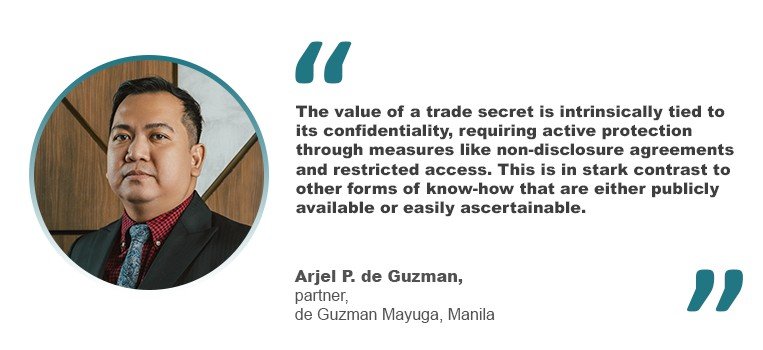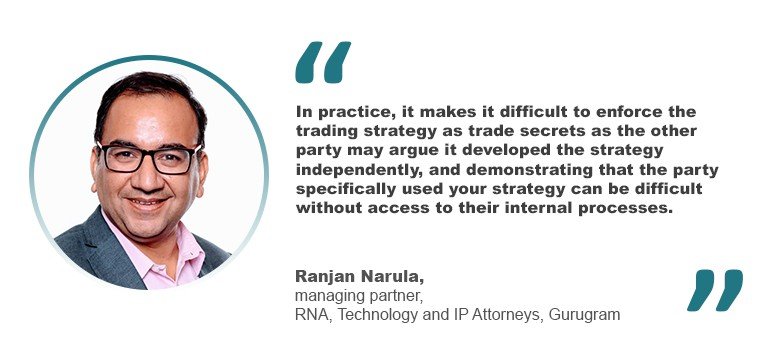Can a trading strategy be protected as a trade secret?
31 March 2025

With propriety trading strategies facing legal scrutiny, Espie Angelica A. de Leon discusses whether such strategies can be protected as trade secrets, citing challenges in India, the Philippines and Australia.
In 2024, options trading and the Indian securities market were thrust into the spotlight of the IP community when a case of alleged theft brewed between two behemoths from Wall Street.
In April 2024, proprietary trading firm Jane Street Group filed a lawsuit against investment management company Millennium Management and two of its traders, Doug Schadewald and Daniel Spottiswood, before the U.S. District Court in the Southern District of New York. Schadewald and Spottiswood used to work for Jane Street but later left to join Millennium’s hedge fund unit. Jane Street claimed the two stole a billion-dollar secret trading strategy from them involving India options, and brought it to Millennium when they came on board. Both firms are active in India’s options trading market.
The trading strategy, which Jane Street claimed is unique, reportedly earned the firm US$1 billion in profits in 2023. Schadewald and Spottiswood disputed the idea that the said strategy can be considered a trade secret. The two said their experience and expertise helped grow Jane Street’s options trading business, not secret “algorithms or automated signals.”
The lawsuit did not push through, however. In December 2024, Jane Street and Millennium Management agreed to settle the case. Nevertheless, Jane Street Group v. Millennium Management did push the question: Can a trading strategy be considered a trade secret and be protected as such?
Trade secret versus know-how
First, let’s focus on what distinguishes a trade secret from any other element that can help grow a business such as know-how or expertise. Remember that the two former Jane Street traders involved in the suit insisted it was their experience and expertise that helped boost the company’s performance in options trading, not some secret algorithm.
A thin line separates a trade secret from other elements that can boost business performance such as know-how, according to Ranjan Narula, managing partner at RNA, Technology and IP Attorneys, in Gurugram.
Know-how is a broad term. It may include any type of business information that possesses economic value for the enterprise. “It can be of the nature that its use may require disclosure during business dealings or transactions,” said Narula.
Know-how may also include information protected as trade secrets.
A trade secret, on the other hand, is more specific. “Trade secrets are valuable and closely guarded by the business to provide an actual or potential economic advantage over others,” Narula remarked. Business strategies, proposals, client databases, designs, programs, drawings, devices, formulae or compositions are some examples of trade secrets.
India has no specific law governing trade secrets. Section 72 of the Information Technology Act 2000 provides protection, but only to a certain extent as it covers merely electronic records. However, the law commission has circulated a bill for the codification of trade secrets.
In the meantime, Indian courts have upheld trade secrets protection under various statutes including contract law, copyright law, the principles of equity and at times, the common law action of breach of confidence. The latter amounts to a breach of contractual obligation.

“Unlike general business acumen or public industry practices, a trade secret comprises confidential information that provides a competitive advantage precisely because it is not widely known. The value of a trade secret is intrinsically tied to its confidentiality, requiring active protection through measures like non-disclosure agreements and restricted access. This is in stark contrast to other forms of know-how that are either publicly available or easily ascertainable,” explained Arjel P. de Guzman, a partner at de Guzman Mayuga in Manila.
The Intellectual Property Code of the Philippines protects trade secrets as “undisclosed information.”
Under Article 4(g) of Republic Act 8293, trade secrets are also treated as protected intellectual property.
Furthermore, the Consumer Act prohibits the use of or revealing of information about any method or process categorized as a trade secret and therefore is entitled to protection under Article 40(f) of Republic Act 7394.
In addition, the Revised Penal Code of the Philippines criminalizes the unauthorized revelation of trade secrets under specific circumstances.
Australia does not provide protection for trade secrets per se as distinct from any confidential information. To establish that such information is indeed protectable as confidential information, it should have a quality of confidence and be imparted in circumstances involving an obligation of confidence.

“The question of distinguishing confidential information from general know-how often arises in the context of former employees, and in this circumstance, the courts are alive to the fact that employees will acquire knowledge of relevant technologies and other information relevant to their work which is not properly characterized as a trade secret, and have noted the danger of confidential information restrictions being used to fetter the ability of former employees to use their skills and experience to compete,” said Katrina Crooks, a principal at Spruson & Ferguson Lawyers in Sydney.
However, the line separating confidential information from know-how is not clear. This will have to be assessed on a case-by-case basis. “Relevant considerations include the extent to which the information was known to other employees and persons involved in the business, and persons outside the business, whether usages and practices of the industry support the assertions of confidentiality, the value of the information to the business and the effort and/or money expended to develop it, the ease with which it could be duplicated, and factors relating to the extent to which it was made known that the information was confidential and was treated and protected as such,” Crooks explained.
Trading strategies and trade secrets: The lawyers’ say
Now, let’s get back to the question: Can a trading strategy, such as an options trading strategy, be protected as a trade secret?
In the Philippines, there is no clear statutory provision or case law which provides that a trading strategy can be protected as a trade secret.
“However, I am of the opinion that trading strategies, under certain situations and attending circumstances, can be protected as trade secrets due to their confidential nature, potential for competitive advantage and the feasibility of implementing protective measures,” said de Guzman. He added that sophisticated trading strategies often involve unique algorithms, quantitative models and complex analyses that are not in the public domain. If successful, a trading strategy can give investment and trading firms a significant financial edge. This will motivate the firms to safeguard the confidentiality of these trading strategies. “Thus, if a firm implements adequate and effective measures to safeguard its confidential and secret trading strategies, those strategies can be classified as trade secrets and are therefore entitled to legal protection,” he said.
It should be noted that under the Philippines’ Amended Implementing Rules and Regulations of the Securities and Regulations Code, “confidential information” includes commercial or financial information prepared by analysts within or outside a company for strategic purposes as well as similar information that raises concerns for business confidentiality.
As the law of confidential information in Australia is not limited to any particular field or type of information, Crooks said that, in principle, a trading strategy could be considered protectable confidential information, depending on the relevant considerations she mentioned. “How detailed is the strategy? What steps were taken by the business to protect it? Was it something which an employee could store in their head? Or would they need to rely on a detailed set of algorithms? A full analysis of the surrounding facts of any given case would be required to form a view,” Crooks stated.

Referring to the India options trading strategy, which was the subject of litigation in Jane Street Group v. Millennium Management in particular, Narula believes it may be protected as a trade secret. “A trading strategy can be protected as a trade secret if it is kept secret and protected by limiting its access to key personnel on a need-to-know basis, having employees and other stakeholders sign non-disclosure agreements or confidential agreements acknowledging IP rights, having protocols in place to protect its circulation and auditing the processes and procedures of sharing the strategy to ensure compliance,” he said.
Narula added though that enforcement is another story. “In practice, it makes it difficult to enforce the trading strategy as trade secrets as the other party may argue it developed the strategy independently, and demonstrating that the party specifically used your strategy can be difficult without access to their internal processes. The departing employees with knowledge of the strategy may take it to competitors and the other party may develop a similar strategy,” he explained.
There are numerous ways for a business enterprise to protect its trading strategy as a trade secret.
As Narula mentioned, the company must maintain its secrecy by limiting access to it, having non-disclosure agreements or confidential agreements in place, implementing certain protocols and auditing processes for compliance.
“Data security measures are essential to protect sensitive data and algorithms and employee training should emphasize the importance of trade secret protection. Meticulous documentation of the strategy’s development and implementation further strengthens its protection,” de Guzman added.
The significance of Jane Street Group v. Millennium Management
According to Crooks, Jane Street Group v. Millennium Management highlights a continuing trend of trade secrets or misuse of confidential information cases brought against former employees. “In the investment industry in particular, these cases will likely continue to be brought, particularly as trading strategies become more and more sophisticated and algorithm-driven, and deliver crucial advantages. This case particularly highlights the difficult distinction between trade secrets and know-how in such matters and the need for careful consideration of all surrounding facts,” said Crooks.
This trend is happening in Australia, she revealed, and it cuts through multiple industries. In a number of these cases, the distinction between protectable confidential information and know-how plays a critical role.
For de Guzman, Jane Street Group v. Millennium Management could have set an important legal precedent. “It could have been the first case law that could have provided guidance whether quantitative trading strategies and algorithms could indeed be considered trade secrets,” he claimed. “It could have also been a valuable opportunity to gauge the court’s willingness to enforce non-compete and similar agreements to protect such secrets in the investment and trading industry.”
But more importantly, the case underscores the importance of implementing robust confidentiality measures to safeguard proprietary trading strategies. “The Jane Street case reinforces the notion that trading strategies, when adequately protected, can possibly be considered trade secrets,” said de Guzman, “serving as a crucial reminder for investment firms to be vigilant in protecting their proprietary information and enforcing their rights.” Jane Street did not require its people to sign non-competition agreements.






